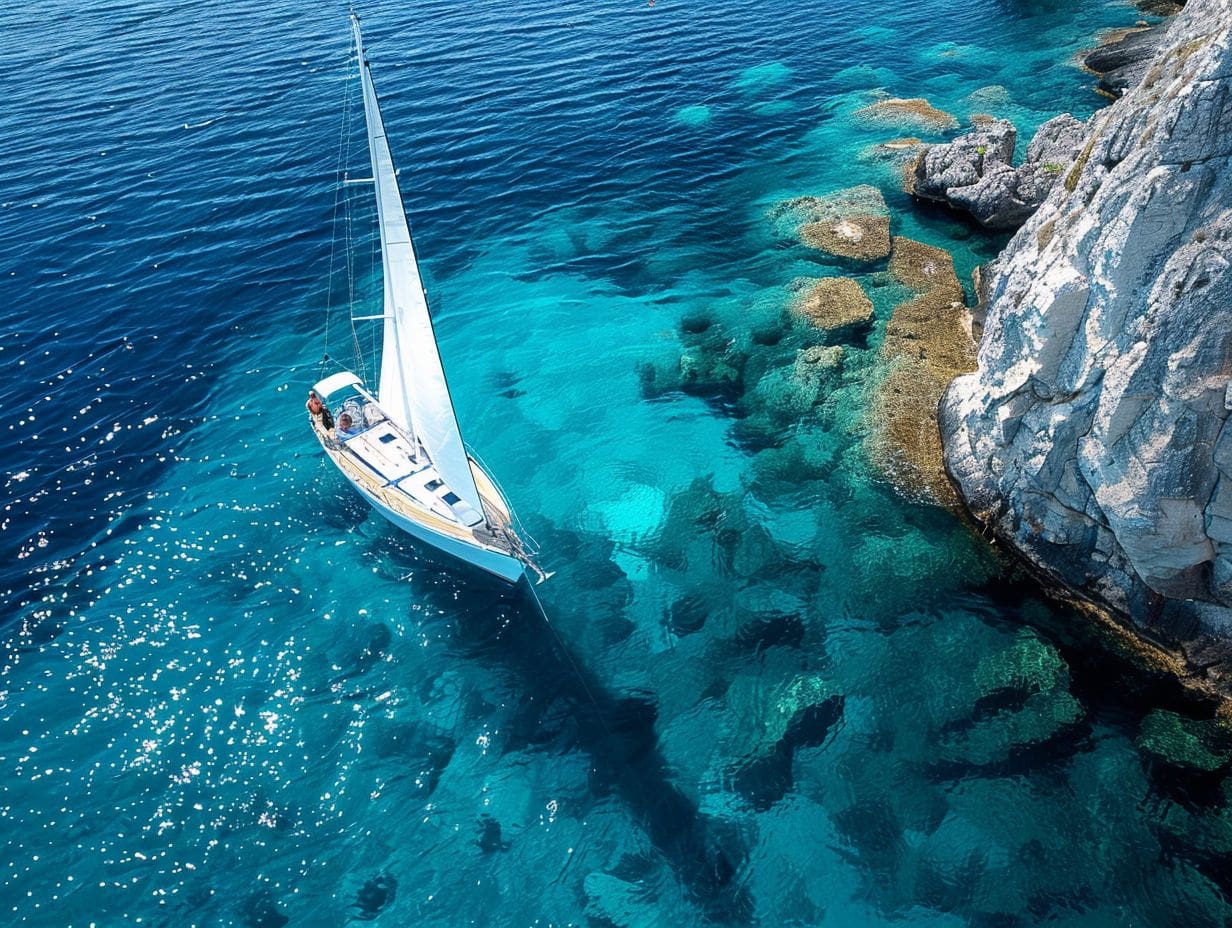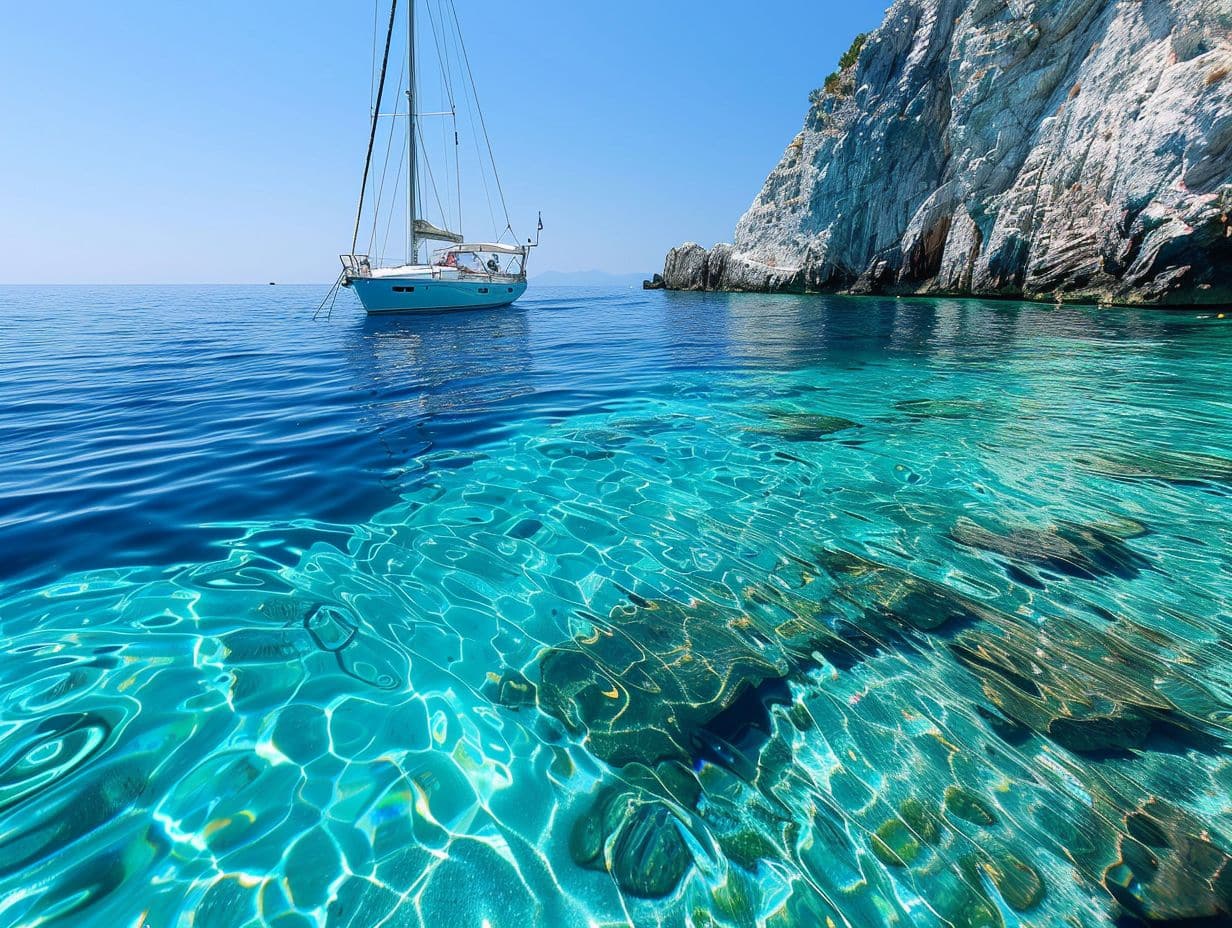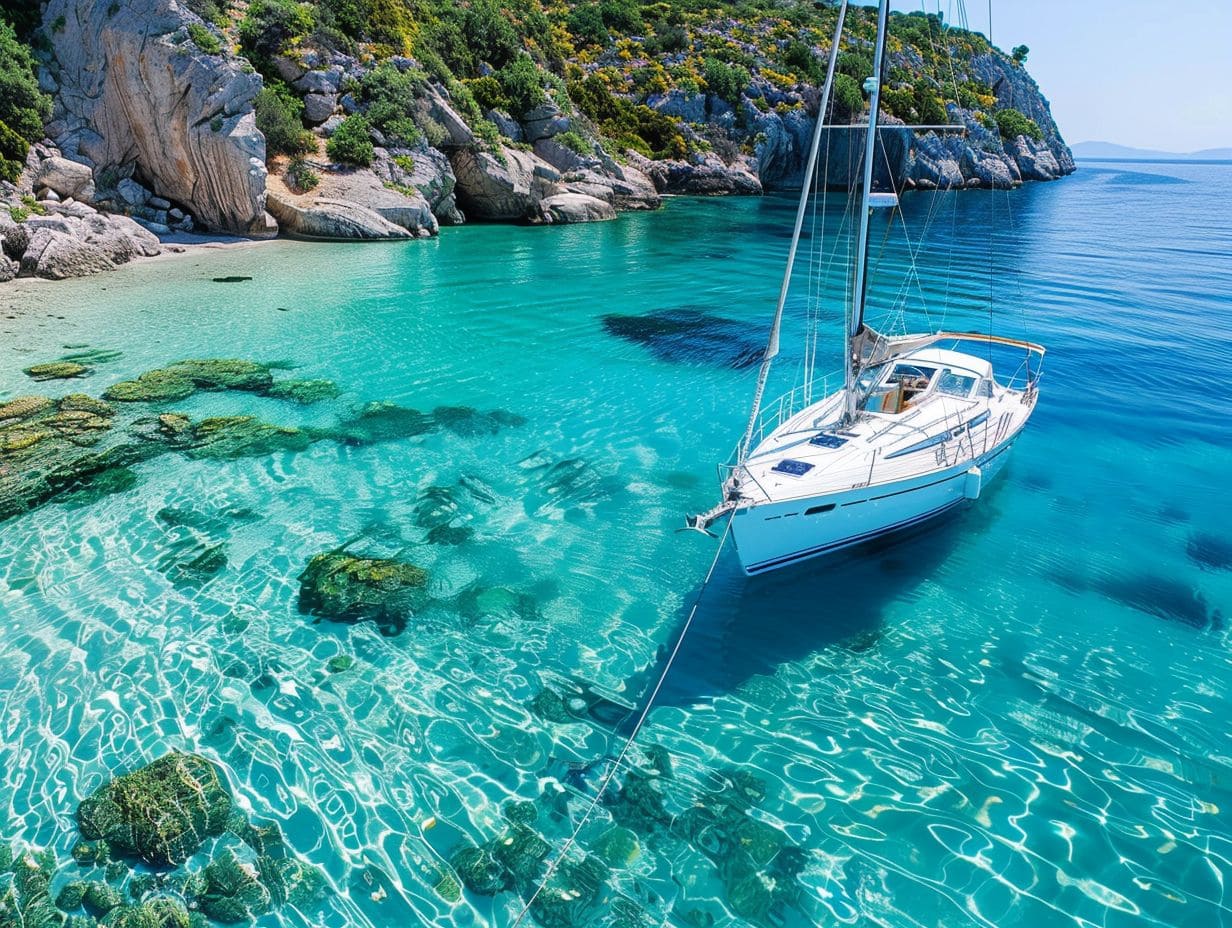Are you an experienced sailor looking to elevate your skills and navigate the stunning waters of the Greek Islands with confidence?
We will explore the regulations and qualifications required for sailing in Greece, including RYA and ASA courses such as RYA Competent Crew and ASA 105 – Coastal Navigation.
Learn about the benefits of advanced sailing techniques, from enhanced navigation skills to emergency response protocols, and find the right sailing course to suit your level of experience.
Key Takeaways:

- Before sailing in the Greek Islands, familiarize yourself with Greek sailing regulations and necessary qualifications, such as RYA and ASA courses.
- When choosing a sailing course, consider your current skill level and whether a beginner or advanced course would be most beneficial for you.
- Learning advanced sailing techniques can greatly enhance your navigation and maneuvering abilities, as well as prepare you for emergency situations that may arise at sea.
Regulations and Qualifications
It is essential for every aspiring sailor to have a thorough understanding of the regulations and qualifications that govern sailing in the captivating waters of Greece. Whether navigating the tranquil Mediterranean or cruising along the Aegean Sea, possessing the appropriate qualifications is crucial for ensuring a safe and enjoyable sailing experience.
Greek Sailing Regulations
Sailing in Greek waters necessitates adherence to specific sailing regulations established by the maritime authorities. It is imperative for individuals to comprehend and comply with Greek sailing regulations to ensure a seamless and secure sailing experience.
Insurance requirements in Greece typically mandate sailboat operators to possess coverage for third-party liability to address accidents or damages. The approved sailing areas comprise the picturesque Cyclades, Ionian Islands, and Dodecanese archipelagos, each presenting distinctive challenges and rewards.
Sailing students are entrusted with the duty of acquainting themselves with local regulations, weather patterns, and emergency procedures to guarantee proficient sailing practices and adherence to proper boating etiquette.
RYA and ASA Courses
Both the Royal Yachting Association (RYA) and the American Sailing Association (ASA) offer a comprehensive array of courses meticulously crafted to augment your sailing expertise and acquire esteemed certifications. These courses hold substantial recognition within the sailing community and are administered by certified sailing institutions and yacht charter enterprises.
Enrollment in RYA and ASA courses not only furnishes individuals with the essential knowledge and competencies to navigate water bodies with confidence but also presents a plethora of opportunities in the sailing domain. Catering to individuals across all proficiency levels, from novice sailors embarking on introductory courses to seasoned mariners pursuing advanced certifications to helm their own vessel, these programs deliver a structured curriculum and practical training. The pedagogical approach of RYA and ASA courses ensures that participants emerge equipped with a robust grounding in seamanship and navigation, positioning them for triumph in their sailing pursuits.
RYA Competent Crew
The RYA Competent Crew course serves as an excellent entry point for novices aiming to acquire fundamental sailing skills and practical experience on the water. This course establishes a strong cornerstone for individuals intending to progress confidently and proficiently in their sailing endeavors.
Throughout the RYA Competent Crew course, participants are introduced to a range of sailing elements, encompassing sail handling, rope work, safety protocols, and rudimentary navigation. By actively engaging in practical training sessions under the mentorship of seasoned instructors, students not only acquire the ability to function effectively within a sailing crew but also deepen their comprehension of boat handling methodologies.
Moreover, the course underscores the significance of teamwork, communication, and seamanship principles, all of which are paramount for ensuring secure and gratifying sailing excursions.
RYA Day Skipper Practical
The RYA Day Skipper Practical course is specifically crafted for sailors seeking to enhance their navigational proficiency and assume the role of a skipper with assurance. Enrolling in this course at authorized sailing institutions allows individuals to augment their sailing credentials and engage in more demanding sailing expeditions.
Throughout the RYA Day Skipper Practical course, participants will acquire practical knowledge in a variety of navigation methods, including chartwork, tidal calculations, and passage planning. The curriculum also emphasizes the refinement of communication and leadership abilities crucial for making effective decisions while at sea.
By mastering these competencies, sailors can equip themselves to competently lead a vessel, ensuring the welfare and pleasure of all individuals on board. Successful completion of the RYA Day Skipper Practical course presents sailors with opportunities to charter boats, partake in flotillas, or even progress towards acquiring commercial endorsements within the maritime sector.
ASA 105 – Coastal Navigation
The ASA 105 – Coastal Navigation course is an essential educational program designed for sailors seeking to enhance their proficiency in navigating coastal waters with precision and expertise. This advanced course, provided by the American Sailing Association (ASA), aims to equip sailors with the requisite skills to navigate a variety of sailing destinations, ranging from the scenic coastlines of South Africa to the vibrant waters of the Caribbean.
Within the ASA 105 – Coastal Navigation course, participants engage in a comprehensive exploration of topics including chart plotting, tidal and current analysis, utilization of electronic navigation tools, and enhancement of their proficiency in interpreting navigational aids effectively. By mastering these critical skills, sailors can undertake coastal voyages with confidence and maneuver through challenging sailing environments with greater accuracy and assurance.
The course emphasizes practical application, enabling sailors to implement their newly acquired knowledge and skills in real-world scenarios. This practical approach prepares participants for the uncertainties and intricacies often encountered while navigating at sea.
Choosing the Right Sailing Course

Choosing the most appropriate sailing course is a critical decision that can significantly influence your sailing voyage in Greece and other destinations. Whether you decide on ASA or RYA courses, it is imperative to assess your existing skill level, aspirations, and desired certifications to guarantee a satisfying and enriching sailing experience.
Beginners vs. Advanced Courses
The choice between beginners and advanced sailing courses is contingent upon the individual’s current sailing experience and aspirations within the maritime realm.
Beginners’ courses typically concentrate on fundamental sailing terminology, boat handling, safety protocols, and rudimentary navigation skills, offering a strong groundwork for individuals who are new to sailing to develop their understanding.
Conversely, advanced courses encompass more sophisticated subjects including advanced sail trim, racing strategies, offshore passage-making, and advanced navigation techniques utilizing electronic tools such as GPS and radar.
For beginners, it is imperative to commence with a course that aligns with their present knowledge and abilities, progressively advancing to more complex levels as competence and confidence on the water are acquired.
Benefits of Advanced Sailing Techniques
Acquiring proficiency in advanced sailing techniques provides a multitude of advantages that extend beyond mere skill enhancement. From improved navigation capabilities to expertise in yacht maneuvering, mastering these advanced skills enhances the sailing experience across various maritime environments, whether it be the pristine waters of the Mediterranean or the dynamic coastlines of regions such as South Africa and the Caribbean.
Enhanced Navigation and Maneuvering Skills
The development of advanced sailing techniques to enhance navigation and maneuvering skills is essential for safely traversing the intricate waters of Greece and other regions. Proficiency in these areas not only guarantees a seamless sailing experience but also instills sailors with the confidence to explore new sailing horizons.
By refining these skills, sailors are better prepared to address unforeseen challenges such as dynamic weather conditions, congested harbors, and bustling shipping lanes. A comprehensive comprehension of navigation principles enables them to plot efficient courses, evade hazards, and make prompt decisions while at sea.
In rigorous maritime settings, particularly those prevalent in the Mediterranean, these skills are crucial for ensuring that voyages are not only successful but also carried out with the utmost safety and efficiency. Hence, dedicating time and effort to mastering navigation and maneuvering techniques is imperative for any sailor seeking to expand their capabilities and tackle varied sailing destinations.
Emergency Response and Safety Protocols

Comprehension of emergency response procedures and strict adherence to safety protocols are fundamental aspects of advanced sailing techniques training. Sailors who possess the knowledge required to manage emergencies at sea and implement effective safety measures are able to navigate the waters of the Mediterranean with confidence and preparedness.
In situations involving unexpected events such as severe weather conditions or equipment failures, a comprehensive understanding of emergency response training becomes essential. These procedures serve not only to safeguard the crew on board but also to preserve the integrity of the vessel.
Training sessions frequently incorporate simulated drills aimed at rehearsing responses to a variety of emergencies, thereby enhancing the crew’s capacity to react promptly and decisively. Safety protocols encompass not only immediate responses but also preventive measures, including routine equipment inspections and communication protocols designed to facilitate swift assistance when required.
Frequently Asked Questions
1. What are some advanced sailing techniques I can learn for sailing in the Greek Islands?
Some advanced sailing techniques you can learn for sailing in the Greek Islands include navigation and route planning, anchoring and mooring, handling strong winds and currents, and sail trimming.
2. Do I need any qualifications to sail in the Greek Islands?
Yes, you will need a valid sailing license or certification to legally sail in the Greek Islands. The specific qualifications required may vary depending on the type of boat and the area you plan to sail in.
3. Can I learn how to sail in the Greek Islands if I have no prior experience?

Yes, there are sailing schools and courses available in the Greek Islands for beginners. However, it is recommended to have some basic knowledge and experience before attempting to sail in the open waters of the Greek Islands.
4. What is the best time of year to learn advanced sailing techniques in the Greek Islands?
The best time to learn advanced sailing techniques in the Greek Islands is during the spring and fall seasons, when the weather is mild and the waters are less crowded. This will also give you the opportunity to practice your skills in different weather conditions.
5. Are there any age restrictions for learning advanced sailing techniques in the Greek Islands?
Most sailing schools and courses in the Greek Islands have a minimum age requirement of 18 years old. However, there may be some programs available for younger individuals accompanied by a parent or guardian.
6. Can I use my sailing qualifications from other countries to sail in the Greek Islands?
In most cases, sailing qualifications obtained in other countries will be recognized in the Greek Islands. However, it is recommended to check with the local authorities or sailing organizations to ensure that your qualifications meet the requirements for sailing in the Greek Islands.


